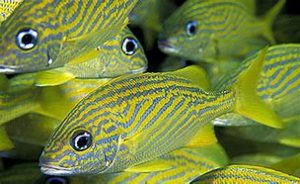
French Grunt Fish
The term “grunt fish” is a common name used for various species of fish that produce grunting sounds by grinding their teeth together. Here are some interesting facts about grunt fish:
Sound Production: Grunt fish are known for their ability to produce distinctive grunting sounds. These sounds are created by grinding their pharyngeal teeth, which are located in the throat area. The grinding action of their teeth produces a series of grunting or drumming sounds, which are used for communication among individuals of the same species.
Family and Species: Grunt fish belong to the family Haemulidae, which includes numerous species found in tropical and subtropical waters around the world. Some common species of grunt fish include the French grunt (Haemulon flavolineatum), bluestriped grunt (Haemulon sciurus), and porkfish (Anisotremus virginicus).
Appearance: Grunt fish have a relatively elongated and laterally compressed body shape. They usually have a silvery or yellowish coloration with various patterns, such as stripes or spots, that help them blend in with their surroundings. Some species may have more vibrant colors or markings, especially during certain stages of their life cycle.
Habitat and Distribution: Grunt fish are commonly found in coral reefs, seagrass beds, and rocky areas in tropical and subtropical regions. They prefer shallow coastal waters but can also inhabit deeper areas. Different species have specific habitat preferences and may be more abundant in certain regions, depending on factors such as water temperature and food availability.
Feeding Behavior: Grunt fish are omnivorous, meaning they consume both plant matter and small invertebrates. Their diet can include algae, plankton, small fish, shrimp, and various bottom-dwelling organisms. They often feed by grazing on algae or by using their specialized teeth to scrape prey off the substrate.
Schooling Behavior: Grunt fish are often observed in large schools, ranging from a few individuals to hundreds or even thousands. Schooling provides benefits such as enhanced protection against predators, increased foraging efficiency, and improved social interactions. Within the school, individuals may exhibit coordinated movements and communicate using their grunting sounds.
Commercial and Recreational Importance: Some species of grunt fish have economic significance in commercial and recreational fisheries. They are valued for their meat, which is considered tasty and has a mild flavor. Grunt fish are often caught by anglers using a variety of fishing techniques, including bait and artificial lures.